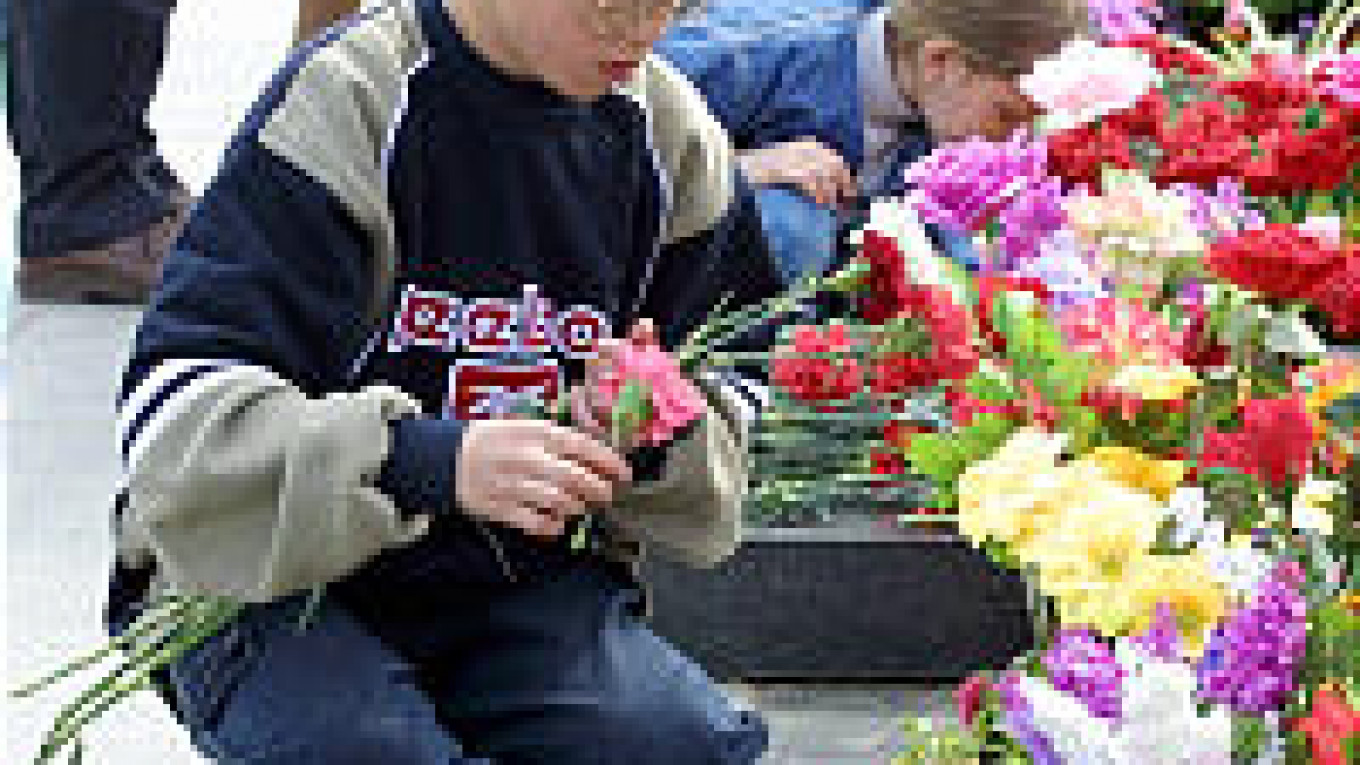Hundreds of residents of Slavutych joined similar crowds at churches, cemeteries and squares across the former Soviet Union in remembrance of the suffering when the No. 4 reactor at Chernobyl exploded at 1:23 a.m. on April 26, 1986, spewing radiation across Europe. People in Ukraine, Russia and Belarus were the most immediately affected.
While remorse for the past was foremost in people's minds Friday, many Ukrainians who live in the radiation-contaminated areas around the now-shuttered Chernobyl plant are focusing more on their poverty than on their fragile health.
"People talk about Chernobyl less and less every year. Economic problems are much more pressing," said Igor Pashinsky, chief psychologist at the Center for Social and Psychological Rehabilitation in Korosten, some 100 kilometers west of Chernobyl, where all 65,000 residents are Chernobyl victims.
Officials acknowledge that survival often takes priority over health concerns for the estimated 3.3 million Ukrainians, including 1.5 million children, affected by the accident.
"Parents try however they can to make money to survive," said Valery Bekh, head sociologist at the Korosten center. "Often kids with two parents live like orphans because their parents are gone all the time."
Birth rates in Ukraine have dropped by 50 percent since 1986, while almost twice as many people are dying.
"It's very hard to say how many cases are directly related to Chernobyl because inadequate nutrition weakens the immune system," said Alexander Tiplitsky, chief doctor at the Norodychi hospital in a mandatory resettlement zone, 60 kilometers west of Chernobyl. "I might see a sick child and say, 'It's radiation,' but then I go to his house and see it's starvation."
However, doctors and public health officials are unequivocal in linking the sharp rise in thyroid cancer -- especially among children -- to Chernobyl. More than 2,100 people who were under 18 at the time of the accident have undergone thyroid treatment since 1986 and doctors say the number could spike to 10,000 cases in the next two years.
Tens of thousands of people disabled by Chernobyl-related illnesses suffer from inadequate health care and 25,000 evacuated families still await housing, according to Emergency Situations Minister Vasyl Durdynets.
Of the 160,000 Chernobyl victims who did get resettled, many have returned to evacuated lands because economic conditions were as bad or worse in their new homes.
Hana Yavchenko, 67, was evacuated from Parishchiv, a village just a stone's throw from Chernobyl, but returned after local officials promised compensation. She and her husband grow their own vegetables and fruits, because semiweekly government deliveries of radiation-free food are not enough.
"Is the food clean? Who knows?" she said dejectedly. "What else do we have?"
According to United Nations officials, 450 to 600 people live in the exclusion zone and as many as 200,000 people live in "severely contaminated areas."
Officials at the Chernobyl plant said last week that the cracks and gaps in the concrete-and-steel shell that covers the damaged reactor total more than 1,000 square meters.
High radiation levels after the accident meant that the shelter had to be built at a separate location and fitted over the reactor. "That's why the job could not be perfect," said Alexander Usayev of the Emergency Situations Ministry.
Western nations helped pay for work in the late 1990s to shore up the shaky structure, and Usayev said state-of-the-art systems continually monitor reactor activity and automatically suppress potential accidents.
However, he did not rule out the possibility that because nuclear fuel remains in the reactor, rain entering through the cracks could trigger a reaction.
Elsewhere in the former Soviet Union, hundreds of officials and victims' relatives gathered at Moscow's Mitino cemetery to honor Chernobyl firefighters who died of radiation-related diseases. Five thousand opposition demonstrators marched through the Belarussian capital, Minsk, for a candlelight commemoration of the 16th anniversary of the disaster.
A Message from The Moscow Times:
Dear readers,
We are facing unprecedented challenges. Russia's Prosecutor General's Office has designated The Moscow Times as an "undesirable" organization, criminalizing our work and putting our staff at risk of prosecution. This follows our earlier unjust labeling as a "foreign agent."
These actions are direct attempts to silence independent journalism in Russia. The authorities claim our work "discredits the decisions of the Russian leadership." We see things differently: we strive to provide accurate, unbiased reporting on Russia.
We, the journalists of The Moscow Times, refuse to be silenced. But to continue our work, we need your help.
Your support, no matter how small, makes a world of difference. If you can, please support us monthly starting from just $2. It's quick to set up, and every contribution makes a significant impact.
By supporting The Moscow Times, you're defending open, independent journalism in the face of repression. Thank you for standing with us.
Remind me later.


